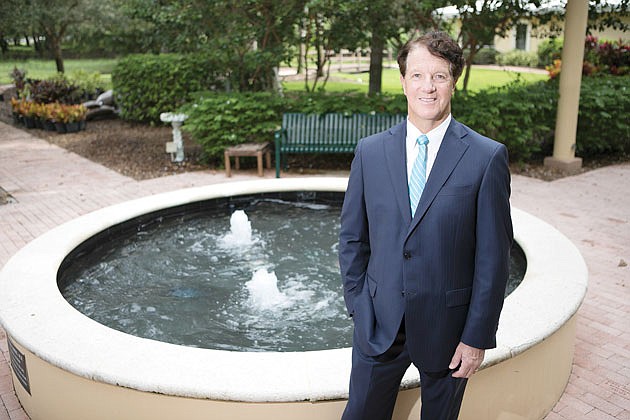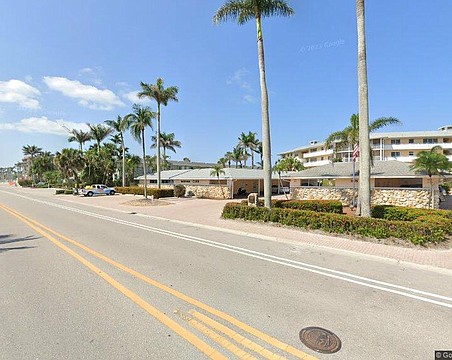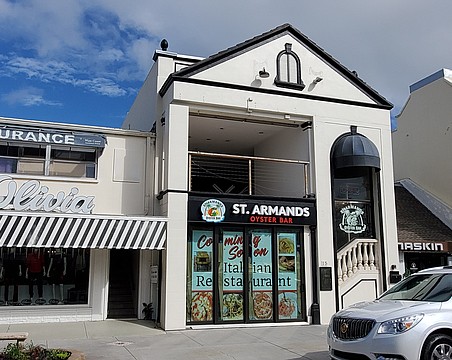For someone who runs an organization that cares for people and their families at the end of a life, Gerard Radford certainly spends a lot of time looking deep into the future.
On the recent announcement he plans to retire from Sarasota-based Tidewell Hospice, for example, he gave the nonprofit's board 14 months' notice. Named CEO of the 700-employee organization in 2010, Radford will remain at the helm of Tidewell and its affiliated entities until Dec. 31, 2018.
Even more future-thinking, Radford, with Tidewell since 1998, when it was Hospice of Southwest Florida, has long considered it paramount to prepare the organization for its long-term future. Says Radford: “My mission is to make sure Tidewell Hospice will exist 10 years, 20 years, 30 years from now.”
That's why Radford, backed by the Tidewell board and senior executives, has executed a unique business model shift at the organization. It's a strategy punctuated by diversifying services — the crux of running a nonprofit like a business. It includes adding and growing separate business units for private-duty home health; primary medical care in patients' homes; a thrift shop; and a real estate enterprise.
Most hospices stick faithfully to end-of-life services, and Tidewell has operated a series of hospice houses for years. That patient population covers about one-third of the total contacts Tidewell has with patients. It provides other traditional hospice services in hospitals, patients' homes and nursing homes. But Radford, 66, says Tidwell officials decided a few years ago that “we need to get patients coming into our orbit earlier.”
With an annual operating budget of $83 million, according to its latest IRS filings, Tidwell is ranked No. 17 on a 2015 LexisNexis list of the largest hospices nationwide based on market share. Tidewell has 0.52% share, according to the report, tied with Clearwater-based Suncoast Hospice. The largest hospice in the country is Louisville-based Kindred Healthcare Inc., which edged out Miami-based Vitas Healthcare — both for-profit companies that, combined, hold nearly 10% hospice market share.
“A lot of the other hospices around the country are just doing what they've always done the last 20 years,” Radford says. “But we could see the clouds were changing. I see us at the vanguard of this. We are on the frontier.”
All the new entities, including the flagship Tidewell Hospice, are now under an umbrella nonprofit, Stratum Health System, founded in 2015. About 94% of the organization's revenue base comes from Medicare and Medicaid. Recent decreases in reimbursement rates, shaking up all medical organizations, add another level of urgency for Radford. “The whole dynamic of health care is shifting,” Radford says, “and we needed to shift the whole culture of the organization to be more diverse.”
More diversification, of services and geography, came earlier this year with the formation of Pontus Health — an alliance between Stratum and Empath Health, parent organization of Suncoast Hospice. Pontus, say officials with both organizations, is designed to help the groups grow and become more efficient through purchasing power and shared innovation.
Additional nonprofit end-of-life care groups can join Pontus in the future.
Moving on
It's under that backdrop Radford announced his retirement Oct. 2. Radford and Stratum board Chairman Michael Uselton began to talk about succession at least a year ago. They consulted with outside experts and created a succession planning committee on the board. “We put a lot of thought into this,” says Uselton. “We want someone who can protect the Tidewell brand, but also grow Pontus and Stratum.”
Radford, meanwhile, says he has no major plans beyond his last day of work. He likes to play golf, enjoys cruises and home improvement projects — but retirement, he says, is something of an open book right now. “I just want to go on to the next chapter,” the Massachusetts native says. “I feel it is time to step away.”
The next top executive will step into an organization with a rich history, in Sarasota and the larger hospice community. Tidewell was founded in 1980. By 2000, the organization, mirroring the growth of the region, saw about 4,000 patients a year. It changed its name to Tidwell in 2005, part of a rebranding campaign.
Tidewell served 8,000 patients in 2010 — the first of seven straight years of at least 8,000 people, with an all-time high of 8,738 patients in 2016. Counties it serves include Sarasota, Manatee, DeSoto and Charlotte. Its payroll is broken down into 420 full-time employees, and nearly 300 part-time employees, in addition to 1,200 active volunteers, according to its 2016 annual report.
Boost growth
The board was the first spot Radford went when it became clear to him Tidewell had to expand. Uselton, a managing partner and owner at Remembrance Services of Florida, which operates funeral homes and cemeteries, says the board understood the sense of urgency. Uselton also brought in outside consultants to talk to the board about the threats and opportunities. “We've done a really great job educating the entire board,” Uselton says.
Those conversations led to new entities like Connexis Medical Services, one of the branded organizations under Stratum. Connexis is a group of non-hospice care doctors who treat patients in their homes, in addition to assisted-living and skilled-nursing facilities. The doctors will perform physical examinations, handle medication management and arrange for any test that can be done where the patient lives.
Another branded organization under Stratum is Approved Home Health, which was founded in 1989 and has been a part of Tidewell since 2010. That unit is thriving in a competitive marketplace, say Stratum executives, which is one reason why Radford says the organization is considering acquiring another home health agency, to further boost the growth. Stratum also obtained a license to do private duty home health care in Charlotte and Lee counties under Radford's watch. “We see a big future in home health,” Radford says. “We have to expand in that area.”
Big picture
Another area of expansion under Radford is fast-growing east Manatee County. That's the location, in Lakewood Ranch, of the next Tidwell Hospice hospice house, the eighth one in the organization.
While it's seemingly counterintuitive to build a facility when Stratum is shifting services to home-based patient care, Uselton says the project fulfills a core part of Tidwell's mission: a peaceful transition for families needing end-of-life care, regardless of financial means. While the bulk of Tidewell's funding comes from Medicare reimbursement, the organization, says Uselton, spends around $4 million annually in charity care without reimbursement. Says Uselton: “Not all hospices will do something like that.”
The 14,810-square-foot hospice house in Lakewood Ranch, which broke ground in March, will be equipped to care for 24 patients. Officials expect to open the facility, a $6 million project, in early 2018.
Tidwell, beyond the growth in services and spaces, faces several bigger-picture challenges, Radford says. One is to overcome the perception that hospice care — created by an Anglican nurse in a London hospital in the late 1960s to provide special care for the ward's dying patients — is one-dimensional. Many families, says Radford, will tell Tidewell caregivers they “wish we knew about you sooner,” further proving the need, he adds, to diversify and expand.
Radford says another challenge is the hospice industry, on a national scale, has several large corporate entities that dilute the kind of full-service care people can get from Tidwell or Suncoast Hospice. “There's a lot of big health care organizations with big budgets that say they do hospice,” he says, “but they don't really do what we do.”
In thinking ahead to retirement, Radford says he's confident the quality of services and care at Tidwell will always be priority. “We consider ourselves to be the best of the best,” Radford says. “We are really going upstream.”
Tidewell Hospice
Year founded: 1980
President and CEO: Gerard Radford
Operating budget, 2015: $83 million
Patients served, 2016: 8,738
Counties served: Charlotte, DeSoto, Manatee and Sarasota
Employees: 420 full time; 300 part time
Volunteers: 1,200
Source: Tidewell Hospice, Guidestar






